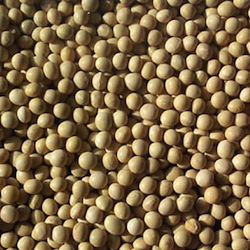 During the 244th National Meeting & Exposition of the American Chemical Society a new integrated soybean biorefinery was revealed. The technology is designed to create a wider portfolio of products from soybeans.
During the 244th National Meeting & Exposition of the American Chemical Society a new integrated soybean biorefinery was revealed. The technology is designed to create a wider portfolio of products from soybeans.
“Mention soybeans to most people, and they immediately think of the oil,” said Ramani Narayan, Michigan State (MSU) University Distinguished Professor, who reported on the new biorefinery technology. “Soybean oil is the world’s most widely used edible oil. It’s in some margarines, shortenings, mayonnaise, salad dressings, frozen foods, baked goods and many other items. But soybeans are about more than oil. Soybeans are nuggets of green gold that can be a treasure trove of ingredients for other products, and our new biorefinery provides a glimpse of that potential.”
The biorefinery is a fairly new product, often times it is associated with second generation feedstocks such as corn stover, algae and agricultural waste that can produce biofuels, biomaterials and biochemicals. Until now, the mention of soybeans in this emerging environment was rare.
 Narayan aid that soybeans pack similar potential as corn as a feedstock but until now, soybean processing facilities have typically focused on producing oils and meal for livestock feed. Switching to the biorefinery concept, the soybean can be transformed into a much wider array of valuable materials. For example, components of a soybean could be turned into polyurethanes, including rigid foam insulation, flexible foams for packaging, as well as coatings, adhesives and elastomers.
Narayan aid that soybeans pack similar potential as corn as a feedstock but until now, soybean processing facilities have typically focused on producing oils and meal for livestock feed. Switching to the biorefinery concept, the soybean can be transformed into a much wider array of valuable materials. For example, components of a soybean could be turned into polyurethanes, including rigid foam insulation, flexible foams for packaging, as well as coatings, adhesives and elastomers.
The soybean meal could be further processed to yield components used in polyester plastics for fabrics, ropes, car tires, plastic bottles, and LCD screens as well as used in Nylon and Kevlar for bulletproof vests and fire-resistant Nomex. Not enough? Soybeans could also be broken down and built back up as as an ingredient is formaldehyde, a toxic chemical used in a range of products from paint to clothing to children’s toys. And the list goes on.
“The biorefinery can utilize essentially every component of the soybean in the production of bio-based ingredients for high-value products,” Narayan added. “It makes sense from a sustainability standpoint, in which we strive to reduce our dependence on petroleum as a feedstock. It also benefits the soybean farmers and raises the value of the local economy.”

